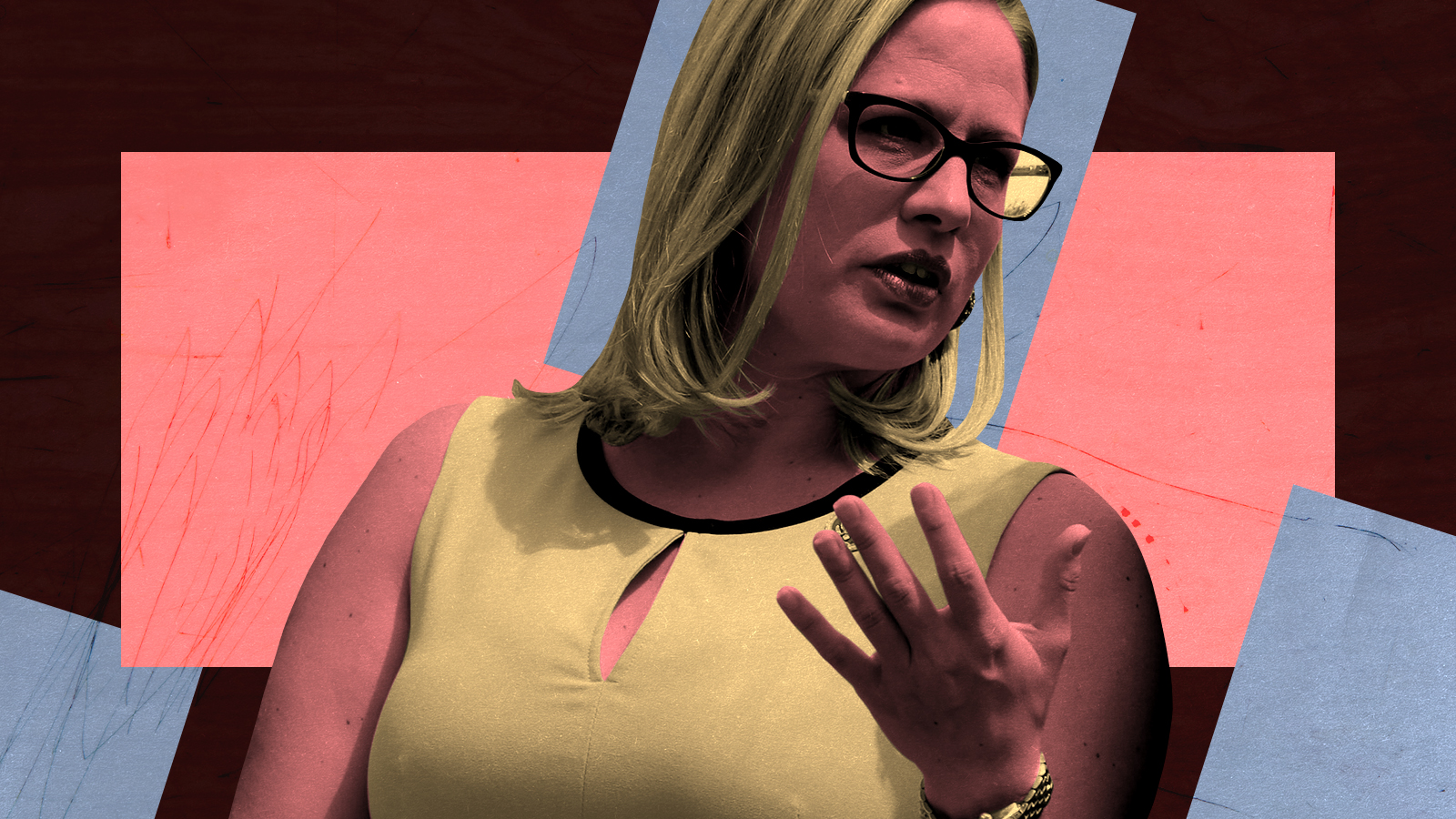Kyrsten Sinema speaks out
The Arizona senator says Dems shouldn't promise too much. There's just one problem.


A free daily email with the biggest news stories of the day – and the best features from TheWeek.com
You are now subscribed
Your newsletter sign-up was successful
Sen. Kyrsten Sinema is finally speaking out.
Though she's been at the center of Capitol Hill's fiercest battles over President Biden's agenda, the Arizona Democrat has been publicly silent in recent months. That has changed in the last few days. After Biden signed the bipartisan infrastructure bill last Monday, Sinema gave interviews to Politico, the Washington Post, and a home state TV station.
Those interviews contained at least one piece of good news for Democrats: Sinema has no plans to cross the aisle and join the Republican Party. "Why would I do that?" she told Politico. While Sinema's efforts to cut down the Dems' proposed social infrastructure bill have drawn support from GOP donors (and overzealous attempts by some progressive constituents to pressure her) the plain truth is that the party can't do anything without her. If she changes parties, Democrats will lose control of the Senate — and with it, any possibility of passing remotely progressive legislation.
The Week
Escape your echo chamber. Get the facts behind the news, plus analysis from multiple perspectives.

Sign up for The Week's Free Newsletters
From our morning news briefing to a weekly Good News Newsletter, get the best of The Week delivered directly to your inbox.
From our morning news briefing to a weekly Good News Newsletter, get the best of The Week delivered directly to your inbox.
Still, Sinema can be pretty frustrating.
The senator wants to brush off notions that she's an "enigma" — "I don't even know what enigma means, really. No one really does," she told the Arizona TV reporter — but that doesn't change the fact that one of the biggest questions on Capitol Hill in 2021 has been "What does Kyrsten Sinema really want?" Despite her sudden openness with the media, the answer is still unclear. "I don't negotiate in the press," she said.
We might be a little more informed about what she doesn't want. For example, Sinema doesn't seem to have much interest in her progressive colleagues' vision of an expanded and expansive safety net — and thinks Democrats' recent political problems can be attributed to the party simply trying to do too much.
"You're either honest or you're not honest. So just tell the truth and be honest and deliver that which you can deliver," Sinema told Politico. "There's this growing trend of people in both political parties who promise things that cannot be delivered, in order to get the short-term political gain. And I believe that it damages the long-term health of our democracy."
A free daily email with the biggest news stories of the day – and the best features from TheWeek.com
It's tempting to think that Sinema is on to something. Political parties really do run into problems when they overpromise and under-deliver. When their control of Congress proved far more narrow than expected after the 2020 election, Democrats didn't really work at lowering or resetting expectations. Sometimes, they even set the bar higher — like when President Biden promised the social welfare bill would cost Americans nothing. That turned out to be false, an unnecessary stumble that will probably cost the party support it can't afford to lose.
The problem with Sinema's critique, though, is that it ignores how she personally is setting the parameters of what the Democratic Party can and cannot deliver. Along with Sen. Joe Manchin (D-W.Va.), Sinema has largely neutered her party's ability to achieve big and necessary things by refusing to consider an end to the filibuster, which creates a 60-vote supermajority requirement in the Senate. Without that reform, Dems have almost zero chance of passing immigration reform, voting rights protections — or most other legislation.
Sinema seems to be fine with that. She's in no hurry to get rid of the filibuster, or even modify it.
"My opinion is that legislation that is crafted together, in a bipartisan way, is the legislation that's most likely to pass and stand the test of time," she told the Post. "And I would certainly encourage my colleagues to use that effort to move forward."
As Sinema probably understands, the recent infrastructure bill was an exception to the rule that bipartisanship in Washington D.C. is dead, at least for the moment. Democrats and Republicans used to be filled with conservatives and liberals in both parties, but that's no longer true, which makes cross-party accomplishments difficult. By now, the GOP's mission of obstruction for the sake of obstruction is well-established. There's no reason to think it will end anytime soon.
That makes Sinema's dream of bipartisan legislation a fantasy. She certainly knows this. Yet her defense of the filibuster is an implicit promise that Democrats and Republicans really can work together for the good of the country. That's a promise she can't deliver, and it probably will damage the health of our democracy.
Joel Mathis is a writer with 30 years of newspaper and online journalism experience. His work also regularly appears in National Geographic and The Kansas City Star. His awards include best online commentary at the Online News Association and (twice) at the City and Regional Magazine Association.
-
 6 exquisite homes with vast acreage
6 exquisite homes with vast acreageFeature Featuring an off-the-grid contemporary home in New Mexico and lakefront farmhouse in Massachusetts
-
 Film reviews: ‘Wuthering Heights,’ ‘Good Luck, Have Fun, Don’t Die,’ and ‘Sirat’
Film reviews: ‘Wuthering Heights,’ ‘Good Luck, Have Fun, Don’t Die,’ and ‘Sirat’Feature An inconvenient love torments a would-be couple, a gonzo time traveler seeks to save humanity from AI, and a father’s desperate search goes deeply sideways
-
 Political cartoons for February 16
Political cartoons for February 16Cartoons Monday’s political cartoons include President's Day, a valentine from the Epstein files, and more
-
 Grand jury rejects charging 6 Democrats for ‘orders’ video
Grand jury rejects charging 6 Democrats for ‘orders’ videoSpeed Read The jury refused to indict Democratic lawmakers for a video in which they urged military members to resist illegal orders
-
 Democrats push for ICE accountability
Democrats push for ICE accountabilityFeature U.S. citizens shot and violently detained by immigration agents testify at Capitol Hill hearing
-
 Will Peter Mandelson and Andrew testify to US Congress?
Will Peter Mandelson and Andrew testify to US Congress?Today's Big Question Could political pressure overcome legal obstacles and force either man to give evidence over their relationship with Jeffrey Epstein?
-
 Rep. Ilhan Omar attacked with unknown liquid
Rep. Ilhan Omar attacked with unknown liquidSpeed Read This ‘small agitator isn’t going to intimidate me from doing my work’
-
 Can anyone stop Donald Trump?
Can anyone stop Donald Trump?Today's Big Question US president ‘no longer cares what anybody thinks’ so how to counter his global strongman stance?
-
 The billionaires’ wealth tax: a catastrophe for California?
The billionaires’ wealth tax: a catastrophe for California?Talking Point Peter Thiel and Larry Page preparing to change state residency
-
 Bari Weiss’ ‘60 Minutes’ scandal is about more than one report
Bari Weiss’ ‘60 Minutes’ scandal is about more than one reportIN THE SPOTLIGHT By blocking an approved segment on a controversial prison holding US deportees in El Salvador, the editor-in-chief of CBS News has become the main story
-
 Will the new year bring a new shutdown?
Will the new year bring a new shutdown?Today’s Big Question A January deadline could bring the pain all over again
